CLASSICAL ASSOCIATION OF IRELAND



Editorial
Dear CAI members, How wonderful to report that we are emerging from our cocoons and are able to meet in person once more! All Branches of the CAI have resumed face-to-face lectures and events, while retaining online streaming for far-flung participants. Dublin Branch enjoyed its first group excursion since the 2020 lockdown to the Classically-inspired sights of St Anne's Park, Clontarf, guided by Liam Bairéad (pp. 2-3). These had fallen into disrepair (at left, the viewing tower in 2017) but recently were restored to their former magnificence (above, the 'Herculanean Temple', once the Guinness family's teahouse). Members of the Association will have been saddened by the news of the passing of Professor Emeritus George L. Huxley. Among his many accomplishments (which you can read about in Kieran McGroarty's fine obituary on p. 16), he served as CAI Hon. President in 1999. A gentle man and gentleman, he will be greatly missed. Requiescat in pace.
Wishing you all a happy festive season and memorable year to come,
Selga Medenieks
2-3
DECEMBER 2022
NEWSLETTER
A CLASSICAL RAMBLE IRISH INSTITUTE OF HELLENIC STUDIES 4-5 BRANCH & UNIVERSITY NEWS 7
Photo (c) S. Medenieks
Photo (c) P. Collins
A CLASSICAL RAMBLE IN ST ANNE'S PARK, CLONTARF
 By LIAM BAIRÉAD
By LIAM BAIRÉAD
On a Saturday morning in midOctober the Dublin Branch of the CAI had its first person-to-person get-together since Covid and lockdown hit the country in March 2020. Alexander Thein had asked me to guide a group of us on an outdoor tour and I chose a place close to my home in Raheny and close to my heart.
We gathered in St Anne’s Park on Dublin’s northside, at its handsome Red Stables, and set off for a delightful 90-minute tour. Our purpose was to view the remarkable classically-themed follies that the Guinness family constructed in the 19th century on what was then their 500-acre Dublin suburban estate.
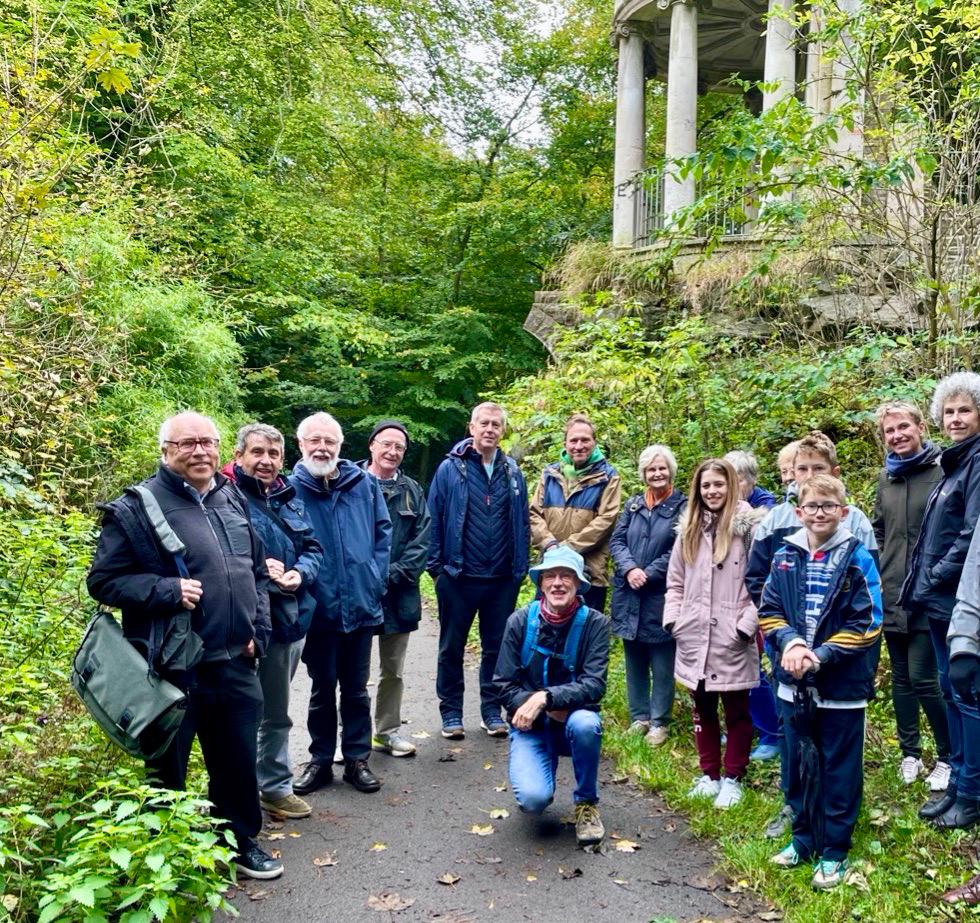
Following the course of the Naniken River we saw their Herculanean Temple and, standing by its charming pond, the Temple of Isis, right.
And we climbed the steep slope behind the temple to see the almost hidden belvedere, top right, a striking three-storey building inspired by a Roman funerary monument, the Mausoleum of the Julii in Glanum (near modern-day Saint-Rémy-de-Provence in the South of France).
The greatest classicallythemed legacy of the Guinness family, their Big House, was tragically gutted by fire in 1943 and pulled down in 1968. But we did also visit the attractive Walled
2 DECEMBER 2022
Dublin Branch members on our ramble, 15.10.2022. Behind us, the Herculanean Temple.
(Photos, above and right: Liam Bairéad; below and right: Paul Collins)
Garden (below) which includes a beautiful Physic Garden, a Suzhou Chinese Garden, and the intriguing Shell Folly.

I strongly recommend that our little ramble be followed by others. Kudos to Ultan O’Gorman who has volunteered to lead us on a Monkstown expedition in the new year! Members of other Branches, please copy!

Would other members like to bring us on a short tour of their favourite outdoor public space? There are plenty of public open spaces with classical themes and/ or allusions in Dublin that we could visit: St. Stephen’s Green with its three Parcae (Spinners of Fate); or Iveagh Garden with its cascade and fountains; or the War Memorial Garden by Islandbridge. If you would like to introduce us to and bring us round your favourite open space, please get in touch with me: liambairead@gmail.com
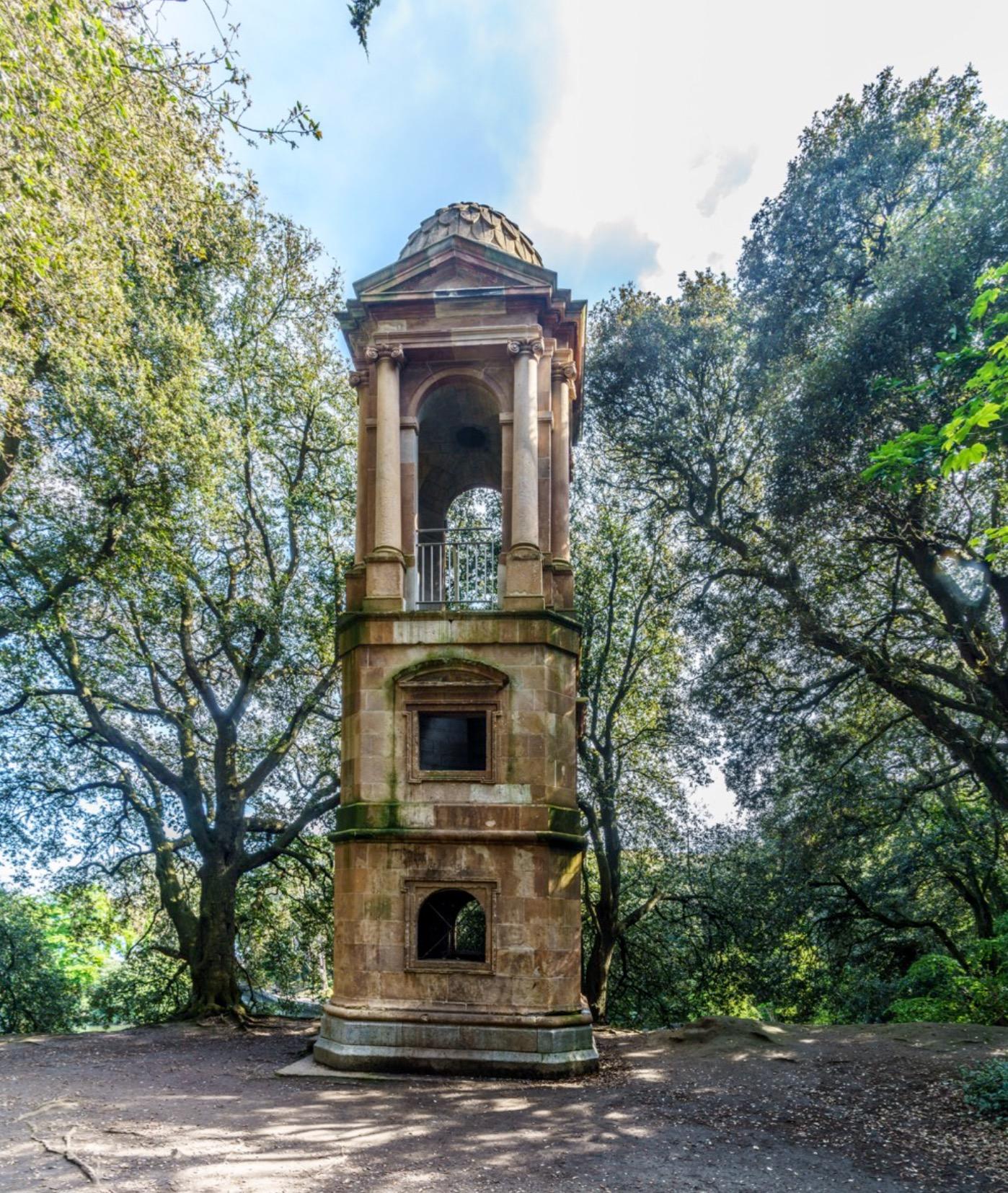

3 www.classicalassociation.ie
Irish Institute of Hellenic Studies at Athens

2021-2022 has been a productive and exciting period for the IIHSA. In January 2021 Professor Joanne Murphy was appointed the new Director of the Institute, following in the footsteps of Dr Christina Souyoudzoglou-Haywood. Joanne is a UCD alumna and is currently Professor of Classical Studies at the University of North Carolina in Greensboro; she also directs one of the Institute's field-work projects: the Kea Archaeological Research Survey (KARS). With characteristic energy, Joanne has already given numerous talks to promote the Institute and to make its work more widely known, and she has, in particular, spearheaded a campaign to promote membership.
The Institute continued many of its research and educational activities throughout the challenges of Covid,
with the notable exception of the annual undergraduate study tour in 2021. So, it was great to see the study tour back in action in the summer of 2022, superbly organised by the IIHSA Assistant Director Dr Anastasia Vergaki, with a lively and engaged group of students participating from UCD, TCD, Maynooth, and also, for the first time, from Queen's University Belfast. This well-established tour offers a wonderful introduction to the archaeology and history Greece in all periods from Neolithic to Byzantine by exploring museums, sites, and landscapes with expert tuition. Two Jason O'Brien bursaries were awarded to postgraduate researchers Gillian O'Brien (UCD) and Dermot Grant (TCD), whose research benefitted greatly from travel to sites in Greece.
4 DECEMBER 2022
During Covid the IIHSA maintained a regular programme of research seminars, moving them online and thus drawing in a wider audience. A distinctive feature has been the regular inclusion of presentations from early career researchers (doctoral students and postdocs) in the programme, while a new initiative since autumn 2022 is a theory seminar, the ‘Multifaceted Aspects of Ritual’ held in hybrid (online/in person) format, and directed at graduate students who are interested in this topic with a focus on Aegean ritual and religion.
The IIHSA's annual Day School on May 14, 2022, offered in hybrid format, was on the theme of 'Glass in the Ancient World', picking up on the United Nations designating 2022 as the 'International Year of Glass (IYOG2022). The seven talks explored glass and glass-related materials across the Mediterranean, with themes including technology, scientific analyses, trade, art, and iconography.
Arising from an international conference organised by the IIHSA and held in Athens, Greece, in January 2020, is the volume Archaeology of the Ionian Sea: Landscapes, seascapes and the circulation of people, goods and ideas from the Palaeolithic to the end of the Bronze Age, edited by Christina Souzoudoglou-Haywood (former Director) and Christina Papoulia (former Assistant Director), published by Oxbow in 2021. The volume presents a thematic collection of papers dealing with the Stone Age and Bronze Age archaeology of the Ionian Sea, situated off the south western Balkan peninsula.
In just the past month, December 2022, two events have been held in Athens and in Dublin, respectively. In Athens, the IIHSA was delighted to hold an event on 2 December, with the support of the Embassy of Ireland in Greece, on the topic of 'Greek and Irish Diaspora: Parallel lives'. While in Dublin, the annual lecture in Ireland was delivered by Dr Evi Margaritis from the Cyprus Institute on 'Domesticity, craft production and ritual: changing patterns of human life in the 3rd millennium Aegean'. The Institute also took the opportunity of this event to pay tribute to former Director Christina Souyoudzoglou-Haywood for her long years of service to the Institute, her leadership in Athens, and for guiding the IIHSA through difficult times during the pandemic.
During Covid, the IIHSA redesigned its website to better showcase our activities, from the fieldwork and museum projects, to the lectures, seminars and day schools, and the student study tours. All of these activities help to promote the IIHSA's mission to contribute – with a distinctive Irish voice – to the study of Greece from earliest times to the present day, and to promote mutual understanding of Greek and Irish culture. We invite you to browse our pages and encourage you to support our work through membership or donation
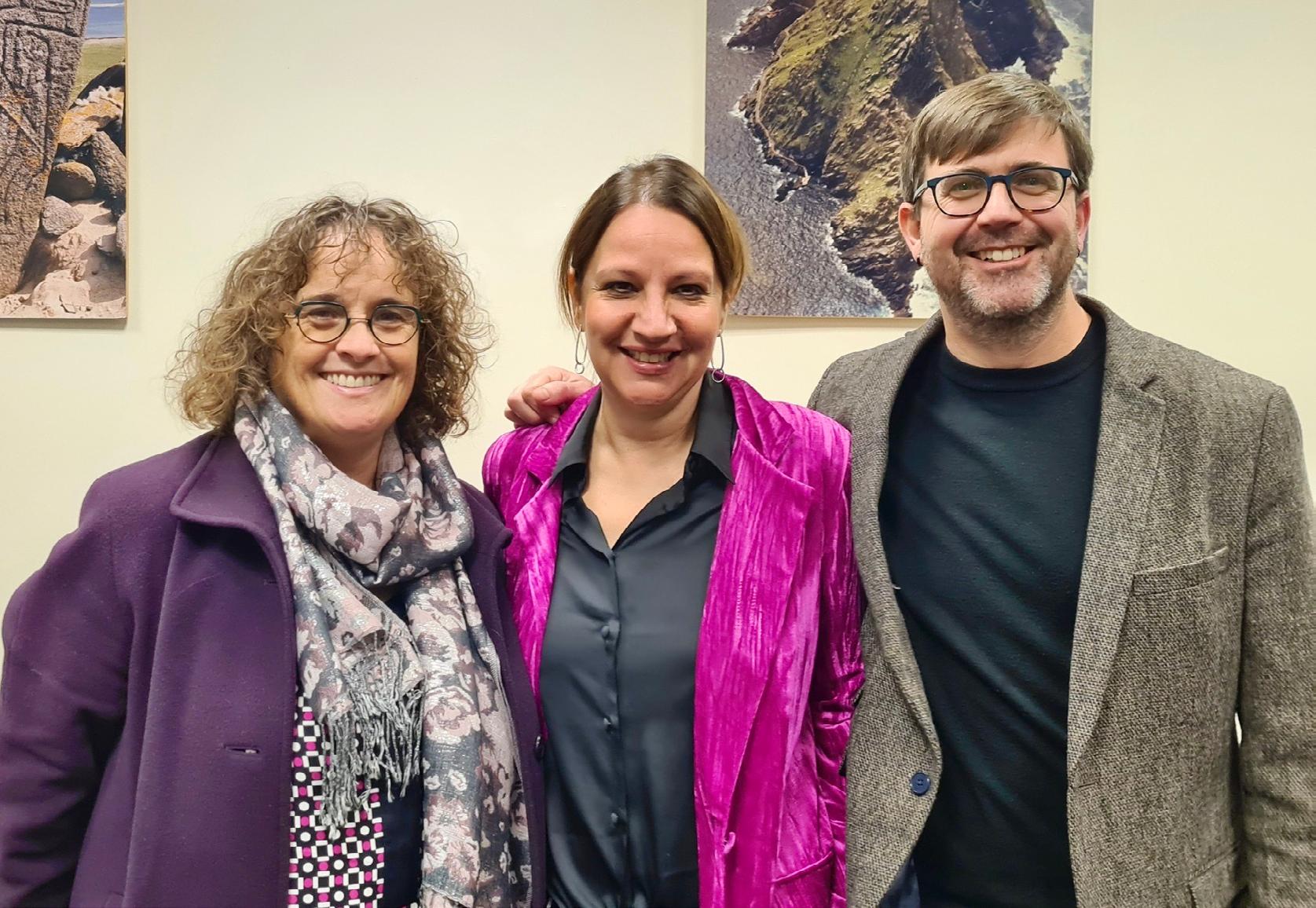
5 www.classicalassociation.ie CLASSICAL ASSOCIATION OF IRELAND
Christine Morris
At the IIHSA annual lecture in Dublin: Joanne Murphy (IIHSA Director), Evi Margaritis (speaker), and Barry Molloy (IIHSA Chair).
ClassicsNow 2023
The third ClassicsNow Festival takes place in Dublin from Friday, 27 to Sunday, 29 January 2023.

Dive into the art, literature and ideas of the ancient Greeks and Romans as interpreted and reimagined by outstanding artists today!
Following the success of our first two festivals, our third weekend will showcase the current burst of exploration and re-engagement with Classics and the ancient world. Artists, writers and thinkers, international and Irish, are taking Classics as a lens to examine our contemporary cultural and political preoccupations and challenges.
Our three-day programme in January will present a series of inviting encounters including readings and performances, online and live in Dublin's public spaces – art galleries and cultural centres – with a number of events aimed at second and third-level students. In interviews, discussions, film screenings and musical theatre performances, you will meet artists who are working in different genres and art forms, in thought-provoking and imaginative ways.
Selected events to look out for include:
'Natalie Haynes in Dublin': bringing insight and originality to her readings of Classical myth, drama and history, this awardwinning author and broadcaster will introduce her latest novel, Stone Blind, a dazzling reinterpretation of the story of Medusa. The talk will take place at the Abbey Theatre on Saturday, 28 January, and is already sold-out.
In 'Antigone Rising: The Subversive Power of the Ancient Myths', renowned Classics scholar Helen Morales explores contemporary recreations of myth and the questions they pose. She will be in conversation with classicist Stephanie McCarter, whose new feminist translation of Ovid’s Metamorphoses speaks powerfully to our 21st century world. This event can be watched online from Friday, 27 January.
'Nostos, Return to Ithaca': join us to watch new episodes of Gavin Kostick’s dynamic version of Homer’s Odyssey take shape, in a special work-in-progress presentation, performed by composer Andrew Synnott, with playwright Gavin Kostick and dance artist Megan Kennedy. The event takes place in partnership with Dublin City Gallery: the Hugh Lane, on Sunday, 29 January, at 12 noon.
This is just a taste of a host of exciting events organised by Festival Director Helen Meany and her committee. Thank you, Helen! For the full story, join the mailing list at: www.Classicsnow.ie
Maeve O'Brien
Classical Association in Northern Ireland

CANI’s year started off brilliantly with a talk from Carlo Gebler on ‘Oedipus Rex: an old play of inexhaustible richness and relevance’. I had emails asking for more! After this we had the fantastic Nicolette Pavlides with ‘Dedications and Ritual Practice at Hero-shrines in Sparta’.
We are delighted to be hosting our honorary patron Natalie Haynes again for a Q&A with Dr Emma Southon on 16 January 2023. The event will take place at Waterstones, Belfast; deails and the ticket portal will be available soon.
Our lectures in the new year include Helen McVeigh on an ancient Greek romance; Arlene HolmesHenderson on Classics education; and Rena Maguire on late Iron Age Ireland, Rome, and equitation.
Updates on our programme are posted to all our social media channels!
Amber Taylor
6 DECEMBER 2022
CORK
CAI Branch & University News

October saw our Branch welcome back Dr Diarmuid Scully (School of History, UCC) and the wonderfully illustrated Hereford Mappa Mundi. The title of Diarmuid’s talk was 'Armenia and its neighbours on the Hereford Mappa Mundi: Classical and Late Antique contributions to the medieval World-Map Tradition'. The map dates from the thirteen hundreds, during the time of the Crusades, and it measures five and a half feet by four and a half feet of well-fed calf skin (no marks, imperfections in the leather). Such a small area managed to hold such an expanse of detail and story that Diarmuid could spend every night talking about it and still there would be more to see. The wealth of knowledge on the map includes Noah’s Ark and the mighty Euphrates River. It is considered a universal library, a map of the known world. The map spells out the word MORS – death – and there is an Irish link to the Book of Invasion. During the Reformation, the map was hidden for fear it would be destroyed but then in the seventeenth century it re-established itself in Hereford, which was a place of pilgrimage. So, if you want to make your own pilgrimage, Hereford Cathedral is home to this most magnificent piece of history.
November saw us welcome Dr Máirín MacCarron from Digital Humanities in UCC. Máirín’s topic was ‘The Venerable Bede and the Origins of AD Dating’. After this talk, I will never look at a date in the same way again! Bede (673-735) lived in the Northumbrian monastery in Jarrow and was a prolific author of more than forty books. Whether we know it or not, we owe the simplicity of our dating system to this monk. He structures his writing in AD dates and, another snippet of knowledge, he is the originator of the footnote! He credits his source, though not all the time, it seems. Prior to Bede’s method of dating, the Classical system had nine methods to date an event (Roman Imperial Reigns, Local Regnal Years, Consular Years, Olympiads, Anno ab Urbe Condita, Era of Bostra, Era of Diocletian, Year of Cartage, Indictions). The religious communities had four ways to do the same. (Annus Mundi, Annus Passionis, Annus Domini, Hijri). It all led to a rather cumbersome and inaccurate way to pinpoint an event. So, for example, this is being written during the presidency of Michael D. Higgins or in the reign of King Charles III, depending on what side of
the border you are reading this! As President Higgins took office in 2011, some eleven years ago, this could have been written in any of those eleven years. Bede did a great thing in regulating chronology. He used AD to recreate the past! December saw us welcome Patrick Ryan of the Limerick Branch to the banks of the Lee. While Patrick was with us, he was not ‘with’ us! Thanks to the modern miracle of Zoom, we were able to hear and see Patrick loud and clear from the distant reaches of Newport in the Education Centre in Cork. Patrick spoke on ‘Arminius and the Teutoburg Forest’. This event occurred in the ninth century AD, the twilight years of the emperor Augustus, and was a monumental catastrophe for the Roman army. Patrick was looking at the defeat from a German perspective. The remains of the forest still exist, and they are located south of Bremen. If you want to indulge in a Christmas read, then Tony Clunn’s book The Quest for the Lost Roman Legions is a must, as it gives a great insight into the location of the battle and the archaeological finds discovered nearby. The highlight of those finds are eight gold aurei found in 2016. Cassius Dio and Strabo, among others, wrote about Arminius and how he showed that the Romans could be defeated by native forces. Arminius’ defeat of the Romans derailed Augustus’ desire to expand further into Germany and, with the fierce resistance of the tribes, it was enough to convince Augustus’ successor Tiberius that further expeditions to the Teutoburg Forrest were just not worth it.
The Cork Branch would like to offer sympathy to the family of the late Joan Trimble of the Sligo Branch. Joan was instrumental in setting up the fledgling Sligo Branch and was a driving force behind the very enjoyable inaugural Summer School held in Sligo in 2011. Joan was a frequent visitor to Cork and had many friends in the Branch. Finally, the Cork Branch would like to wish its members and readers all the joys of the Christmas season. The Branch will resume lectures in February 2023 and we would encourage you to come in person, listen in comfort, and learn something new (hopefully!)
J. O'Donoghue
7 www.classicalassociation.ie CLASSICAL ASSOCIATION OF IRELAND
Greeting all from a rather damp Cork on a frosty December day!
DUBLIN
The Dublin Branch enjoyed a great series of talks this term. We were delighted to be back in person in October for a talk on ‘Sexual Violence in Greek Literature’ by Suzanne Lynch, a PhD researcher from the School of Classics at UCD. As we held this event in a hybrid format, we were still able to welcome our international attendees on Zoom. Suzanne took us through a wide range of literary sources, pointing out that the language used to describe sexual violence is often euphemistic and decorous and may even carry an implication of consent, such as the language of marriage. By addressing this issue of language, Suzanne highlighted that the extent of sexual violence in Greek literature can be easily overlooked. We wish Suzanne the very best of luck with her upcoming viva!
In November, we welcomed Dr Sarah Corrigan (IRC Postdoctoral Fellow, University of Galway) online for a talk on classical reception entitled ‘Hell in the Ocean in Early Medieval Ireland’. Sarah focused on the Voyage of St Brendan or Navigatio sancti Brendani abbatis and how it crosses the boundaries of voyage and vision narratives. She explained that concepts relating to the afterlife in the Ocean, which we find in this text, have precedent in earlier literature such as the Visio Pauli and exegetical comments from early Christian commentators. These intertexts act as ‘signposts’ to the readers of the Navigatio who are being redirected to this earlier literature. This was a fascinating lecture, for those who were already familiar with the Navigatio and for those who weren’t, and we offer our congratulations to Sarah on her new post as Allan J. Myers Lecturer in Latin Language and Literature at the University of Melbourne!
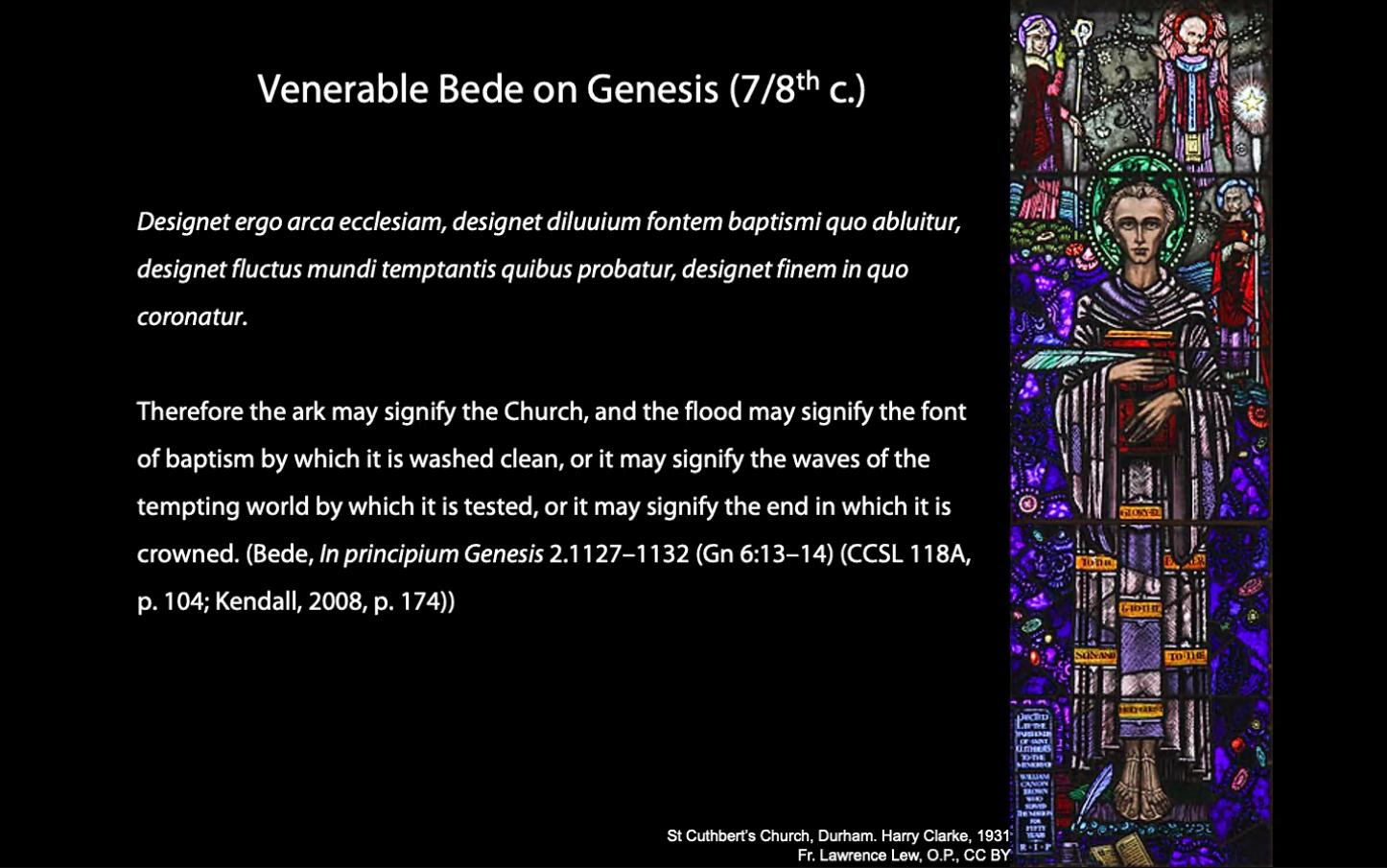
For our final talk in December, we were joined by Dr Francesco Ripanti for an online lecture on archaeology and wellbeing: ‘Archaeology on prescription: how the material past can make people feel better’. Francesco explained the concepts of public and community archaeology, and introduced his project ‘Linking community archaeology and wellbeing in the Mediterranean’ (a.k.a ‘LOGGIA’, funded by the European Union as a Marie SkłodowskaCurie Postdoctoral Fellowship). The aim of the project is to evaluate to what extent community archaeology practices can contribute to community wellbeing in the Mediterranean context, with case studies in the Xeros River valley (Larnaca District, Cyprus) and Vignale (Tuscany, Italy). Through collaborations with doctors and psychiatrists, LOGGIA engages children and people with disabilities and illnesses to historic landscapes, involving them in fieldwork where possible and in re-enactment groups. For anyone who missed the talks, recordings are available on the Classical Association of Ireland YouTube channel: https://bit.ly/CAI_Youtube We look forward to our next series of talks in 2023!

8 DECEMBER 2022
Lisa Doyle
MAYNOOTH UNIVERSITY
We looked forward to welcoming you all to our Maynooth Classics seminar series, held on Fridays at 16:00 in John Hume Lecture Theatre 7 and also broadcast online to participants registered through Eventbrite. The series convenor was William Desmond (william.desmond@mu.ie). Our super programme for Semester 1 was:
18 November 2022
Dr Olaf Almqvist (University College Dublin & Trinity College Dublin) - hybrid ‘Cyrus, Sahlins, and Stranger Kings’
2 December 2022
Prof. Lee Fratantuono (Adjunct Professor, Maynooth University) - online only ‘Pindar and Virgil’
9 December 2022
Dr John Curran (Queen’s University Belfast) - hybrid ‘Pilate, Barabbas, and the Privilegium Paschale’
Careers with Classics 2022
The Careers with Classics event took place on 22 September 2022, for the second year in a row, in the brand new TSI building on the Maynooth University campus. We welcomed seven international speakers from NY, Amsterdam, Charlotte North Carolina, Belfast, and Ireland, who shared their academic and professional journey with a great audience of current pupils and third level students from schools and universities across Ireland.
Among the speakers were Desmond O’Toole from ASTI, Rachel Travers from Engage Education Ireland, Luca Lai from the University of North Carolina, Michael Williams from the University of Amsterdam, Helene Cullyer from the Society of Classical Studies, and, of course, our very own Helen McVeigh, founder of H.M. Classics Academy.
The event was broadcasted live in several sixth year classes, with teachers, pupils and guidance counsellors joining us online. The event was recorded and is accessible on the MU YouTube channel now!

WATCH Careers with Classics!
2022: https://youtu.be/FeRaaQGsp0A 2021: https://youtu.be/zHtrqE8MNhw
9 www.classicalassociation.ie
ASSOCIATION OF IRELAND
CLASSICAL
Maeve O’Brien
CAI Latin Summer School 2022
In September, all students who attended the CAI Latin Summer School were issued a certificate of attendance signed by the CAI Chair, the secretary, and the course coordinator.
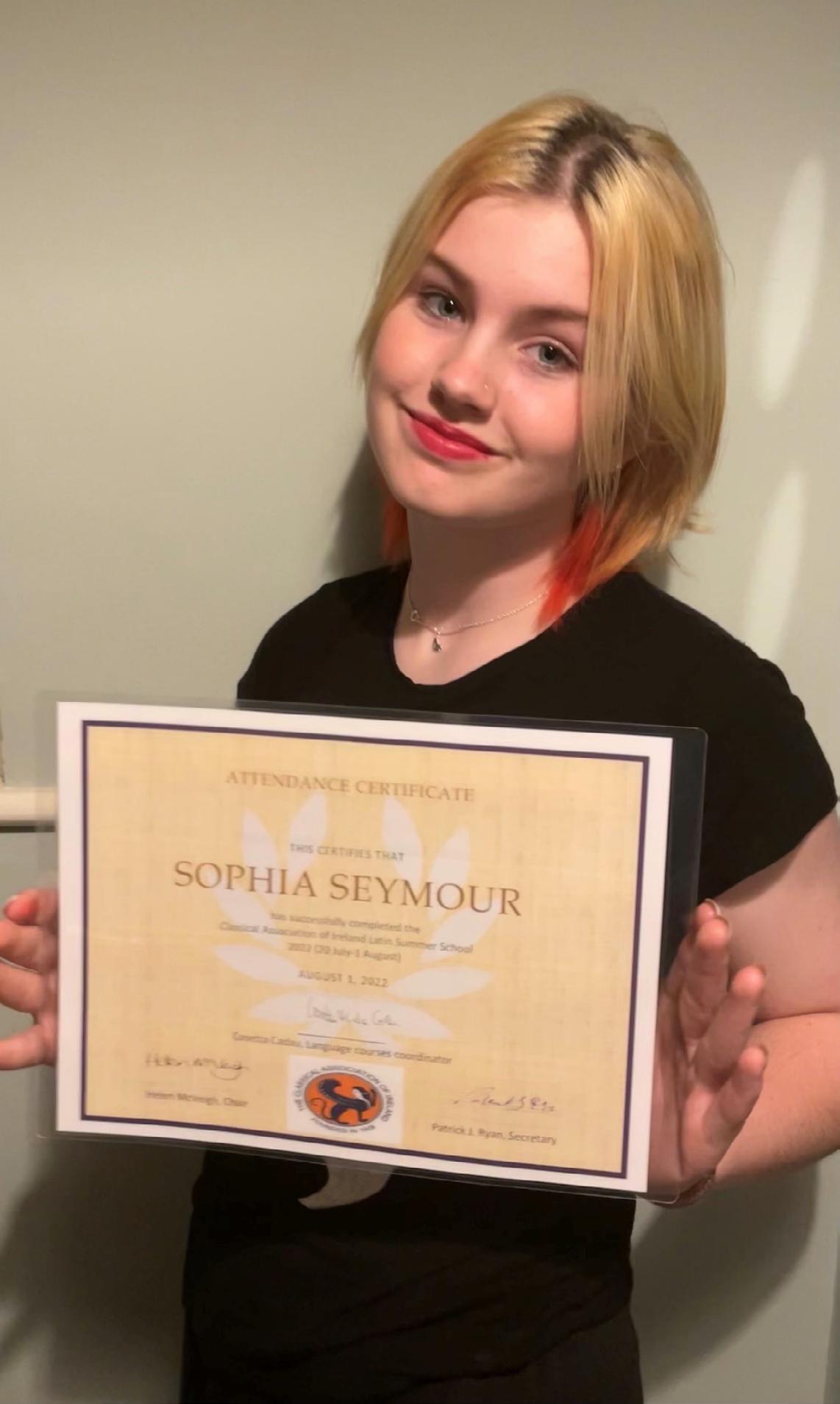


The certificates were generously funded by the Department of Ancient Classics at Maynooth University; many thanks to Dr Desmond for supporting this initiative. Once again, very well done to Seamus O’Sullivan for teaching this new cohort!
Here are some images of our very proud and eager Latinists!
Cosetta Cadau
DECEMBER 2022
UNIVERSITY COLLEGE
DUBLIN
The UCD School of Classics has continued in its commitment to outreach, and in the autumn Dr Jo Day, curator of the Classical Museum, and Dr Bridget Martin, Director of Access Classics, joined forces to welcome a diverse range of secondlevel schools and students to UCD. Students enjoyed tours of the museum (pictured below), including handling some of the artefacts, workshops on ancient Greek and sample lectures. Access Classics also continued with their school visits, including a recent trip to Gonzaga SJ to meet all 1st year students and encourage the uptake of ancient Greek in 2nd year. We look forward to meeting lots of new schools and students in the spring.

CLASSICAL
In staff news, we congratulate Dr Bridget Martin and Eleanor Kellett for winning 2021/22 College of Arts and Humanities Teaching and Learning awards (bottom left). Dr Martin won in the Teaching Excellence category, and Eleanor, a first-year PhD student writing a thesis on ‘Tattooing in the Classical World’, in the Outstanding Contribution to Learning category.
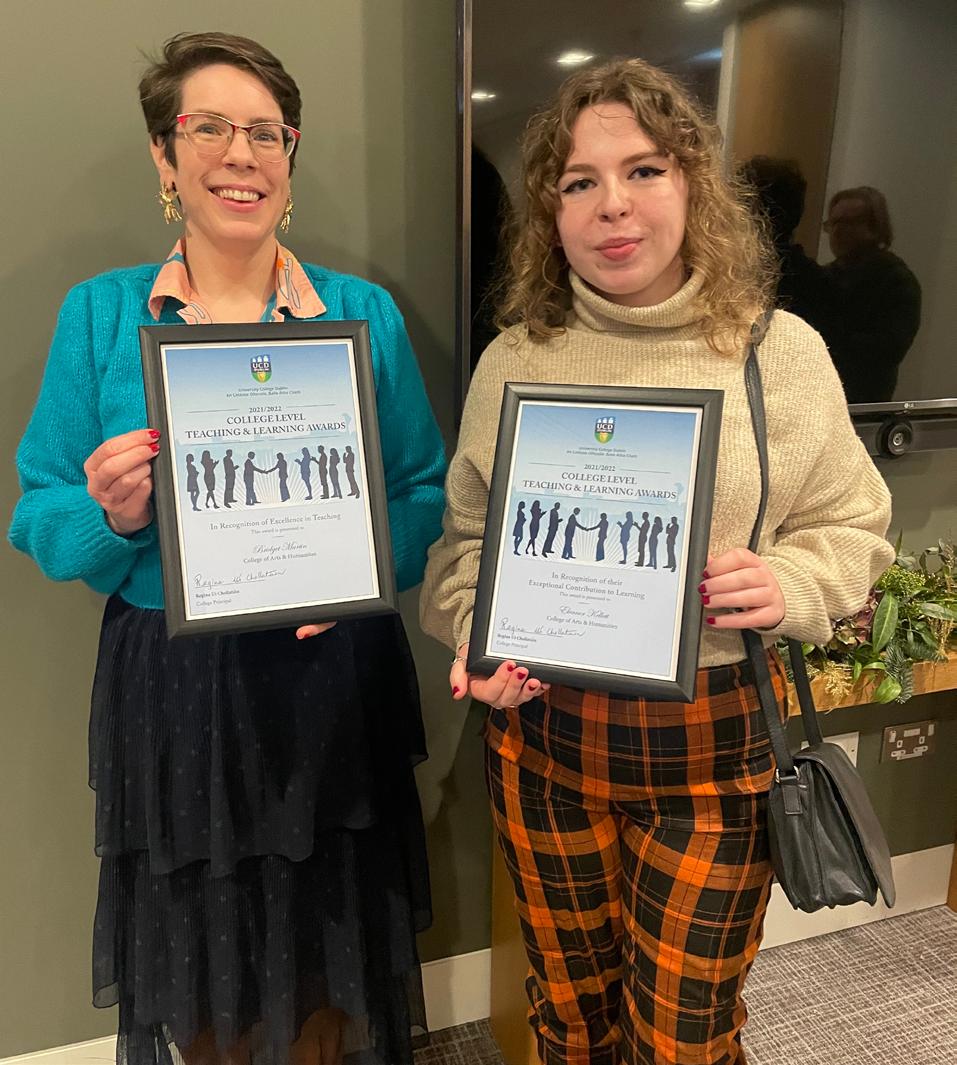
One of the highlights of the year for the UCD Classical Society was the performance of Aristophanes’ Wasps (bottom right). As the auditor Melody Dilger explained, the play is a fan favourite for the students, and the event was hosted in collaboration with the Jazz and Draw Societies to bring together people of various backgrounds (from drama to law). It was a great evening, and the Society is looking forward to its next production.
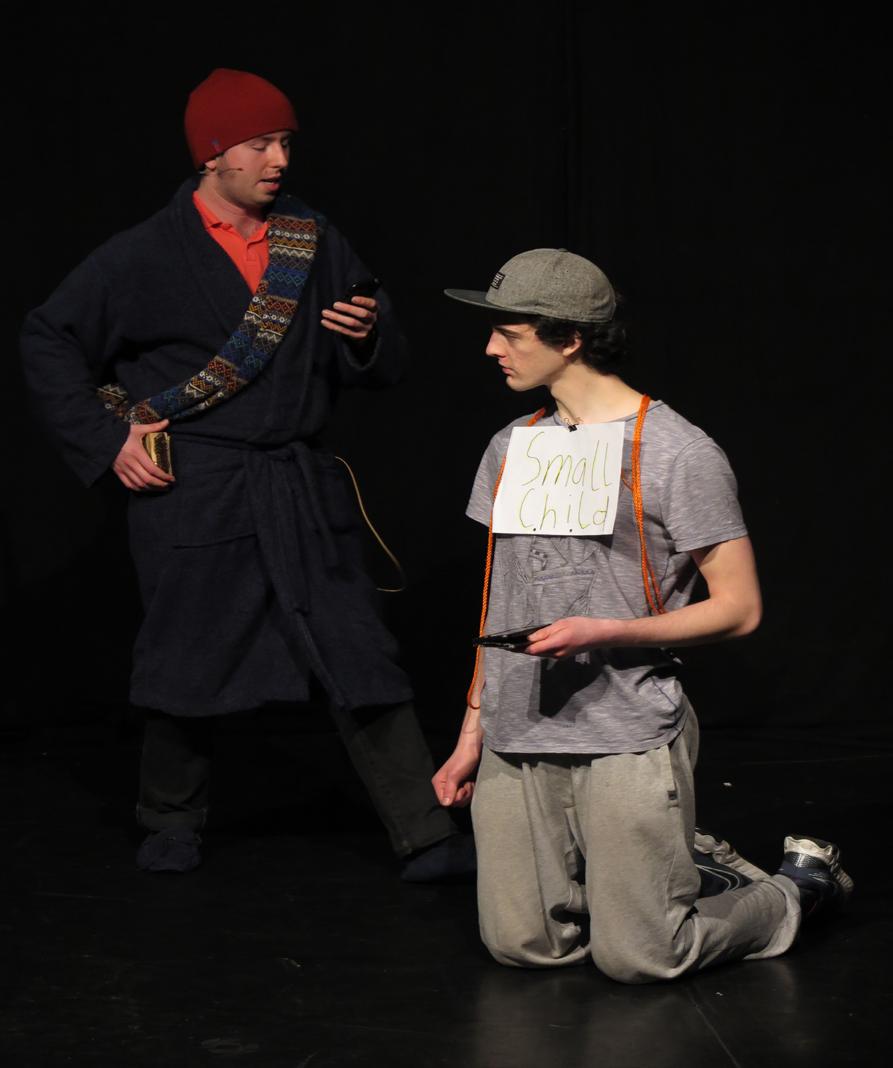 Thein
Thein
11 www.classicalassociation.ie
OF IRELAND
ASSOCIATION
Alexander
UNIVERSITY OF GALWAY
The academic year 2022-2023 brought a new name for the University of Galway and a full revival of communal activities after the restrictions of the pandemic. Despite the circumstances, we organised two public events on intersections between Classics and the creative arts during 2022. In April, postdoctoral researcher Dr Sarah Corrigan organised ‘Gilgamesh in conversation’, an event hosted at Galway City Museum (right), featuring Prof. Michael Clarke talking with playwright Marina Carr and Macnas director Noeline Kavanagh on their new film Gilgamesh, which weaves together inspiration from both the Mesopotamian epic and the Irish landscape.
In June the theme of creativity was further explored in ‘Ekphrasis in its Contemporary and Ancient Contexts’,

You can rewatch 'Gilgamesh in conversation' on YouTube: https://www.youtube.com/watch?v=W6o1xWDTD6Y
a series of workshops organised by Dr Peter Kelly (Galway) and Prof. Roy Gibson (Durham) on vivid description in both ancient and modern literature, featuring contemporary poets John McAuliffe, Vona Groarke, our own alumnus Dr Yiannis Doukas, and others.

Our research activity is lively as ever. Dr Edward Herring published a new monograph on Paestan red-figure pottery in May (above), following up his 2018 monograph on Apulian pottery.
Dr Jacopo Bisagni is currently finishing his four-year Irish Research Council (IRC) Laureate project, IrCaBriTT. He and his team have been investigating the exchange of Latin texts and manuscripts between Ireland and Brittany. One publication from the project will be a volume on Breton manuscripts, arising from a conference held in Galway in June 2022. Prof. Michael Clarke continues his work on the
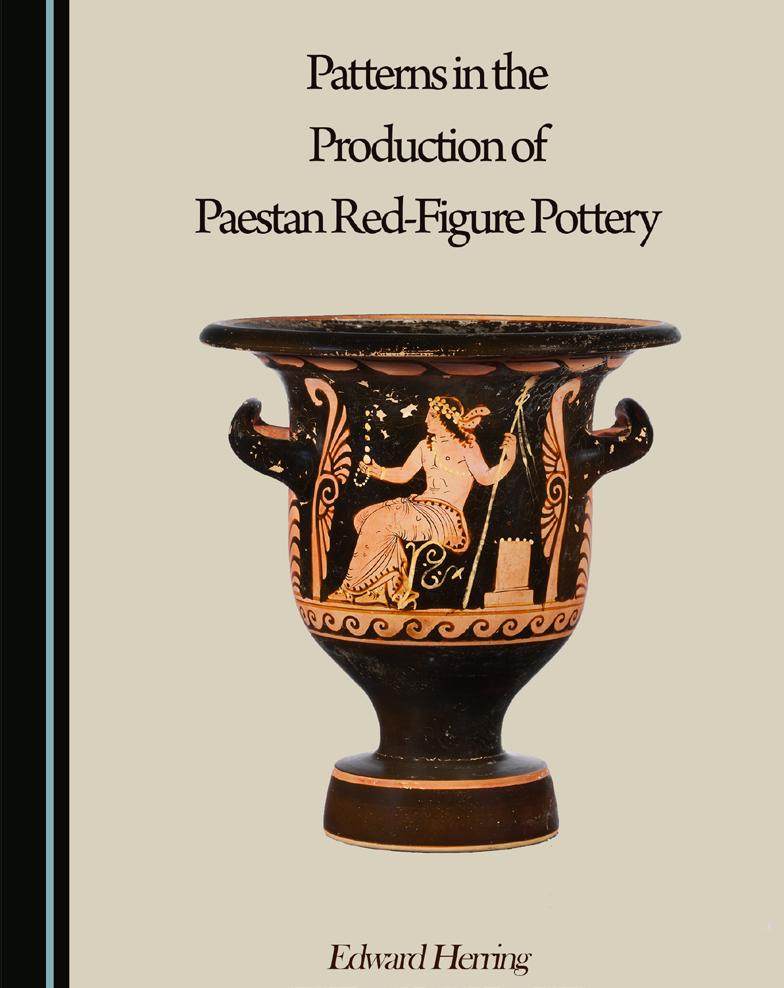
12 DECEMBER 2022
reception of the ancient epic tradition, and was co-organiser with Prof. Isabelle Torrance in August 2022 of a conference in Aarhus on Classical antiquity and medieval Ireland. Dr Pádraic Moran has recently won funding for another fouryear IRC Laureate project, titled Global and Local Scholarship on Annotated Manuscripts (GLOSSAM). The project will investigate practices of reading, translation and commentary in pre-modern literary traditions spanning all the way from Ireland to Japan, with a special focus on the Irish transmission and mediation of Classical and Late Antique Latin texts.
We were delighted to welcome Dr Catherine Ware from UCC in November, who spoke to our student Classics Society on the influence of epic in the panegyric tradition. We look forward to more Classics Society talks in the new year (after a pandemic hiatus). On 18 February 2023, Dr Pádraic Moran will give a public talk in the City Museum on Irish-language translations of Homer’s Odyssey, focusing in particular on the careers of Professors George Thomson and Margaret Heavey of University College Galway (as it was), who translated Greek and Latin classics into Irish in the early decades of Irish state. The event will feature readings from the Odyssey in Greek, Irish and English.
We are very proud of all of our alumnae and alumni, and especially of three PhD graduates who secured new, permanent academic positions in the past year. Many congratulations to Dr Eóin O’Donoghue (PhD 2011), who moved to a new position in Classical Studies at Brandeis University (Massachusetts), to Dr Sarah Corrigan (PhD 2017), who will join Classics at the University of Melbourne in 2023, and to Dr Peter Kelly (PhD 2016), who has recently taken up a lectureship in Classics at Princeton. Your success will inspire many others!
You can read more about the activities of the department, along with reflections from staff and PhD students, in our newsletter, Western Classics, available on our website: http://www.universityofgalway.ie/classics
Pádraic Moran padraic.moran@universityofgalway.ie
TRINITY COLLEGE DUBLIN
A highlight of the academic year was the W.B. Stanford lecture series held over three days (6-8 April 2022) and delivered with wit and eloquence by Dr Donncha O'Rourke on the theme 'Erring willingly: weakness of the will in Roman elegy'. It was a great pleasure to welcome Donncha, a TCD alumnus, back to the Department, and to host these lectures in person (as well as facilitating colleagues, alumni, and friends from around the world to join online).
During the Stanford series, and also in a celebratory mode, the Department presented Professor Emeritus Brian McGing with a special issue of Hermathena containing papers written by colleagues and friends in his honour.
Another significant event for the Department was the inaugural lecture delivered by Ahuvia Kahane on 1 March 2022, marking his appointment as the Regius Professor of Greek (1761) and A. G. Leventis Professor of Greek Culture (2017). Ahuvia's lecture was entitled 'The Boar, the Scholar and the Ethics of Classical Philology'.
Several excellent conferences and workshops took place during the year: in June 2021, Dr Davide Amendola (IRC Postdoctoral Fellow) and Dr Shane Wallace hosted a two-day conference on 'Greek Cities’ Responses to Athenian Institutional and Judicial Legacy in the so-called ‘Hellenistic Polis Convergence’'; in December 2021, Dr Silvia Speriani (IRC Postdoctoral Fellow) organised a conference called 'POLYTROPOS AJAX: Roots, Evolution and Reception of a Multifaceted Hero'. Colleagues with interests in the Hellenistic world in TCD Classics gathered in April for a oneday workshop on 'Approaching the Hellenistic World' which showcased research by staff and research students.
In November 2022, the Department was delighted to host 'Aphrodite Rising: 25+ years of Cypriot Studies at Trinity'. This event was a celebratory day of talks on archaeology, history, and cultural heritage, and discussions of art and photography together with exhibited works, organised in collaboration with the Embassy of the Republic of Cyprus.
On the teaching side of our activities, TCD Classics has recently developed a new interdisciplinary degree called Classics, Ancient History and Archaeology (CLAHA) which offers great flexibility for students to follow their particular interests within Classics, as well as fulfilling Trinity Classics' mission to make the study of ancient languages accessible and welcoming to all students, irrespective of their background. TCD Classics has also joined the College's Dual Degree programme with Columbia University, where students take their first two years in Trinity, then move to New York for years three and four, and are awarded a degree by both institutions.
Another new initiative is Hestia, the official blog of Trinity College Dublin Classics with contributions from our whole community, staff, students, and friends of the Department too. We aim to share news about our research, teaching, and other activities, as well as our views and reflections about the ancient world. Dip in and find out more!
Looking ahead we invite you to 'save the date' for the next set of Stanford Lectures, which will be in the week beginning 27 March and will be delivered by Professor Carl Knappett of the University of Toronto.
Morris
13 www.classicalassociation.ie
ASSOCIATION OF IRELAND
CLASSICAL
Christine
LIMERICK
The Limerick Branch resumed normal face-to-face lectures in September. Our venue for several years past has been the Limerick Education Centre, on Dooradoyle Road, and we were delighted when the management there said they would be happy to facilitate us once again at least for the current term, both for lectures and for reading groups. With the accommodation problem off our minds, the committee set about organising a programme of lectures. The programme comprised four lectures in all. Once again, we were well served by the contributions of our Branch members.
On 14 September Patrick Ryan led off with ‘Arminius and the Teutoburg Forest’. He was followed on 19 October by Patrick Hayes, who spoke under the title of ‘A study of Ideology in the Hellenistic Period’. On 16 November Matthew Potter gave us an illustrated talk entitled ‘The Fall of the Roman Empire’. Finally, on 30 November Clodagh Lynch treated us to ‘The Hunting Scene on the Balline Hoard’, a subject that forms part of her PhD studies at NUIG.
Meanwhile, it was decided not to assemble the reading group for the time being. Instead, Patrick Ryan advised members to join Liam Bairéad’s group online. Some members did so.
Branch members were deeply saddened by the passing of Professor Emeritus George Leonard Huxley. George, as he was known to us, had been a frequent visitor and speaker at the Limerick Branch over a period of twentythree years and had taken all our members to his heart. He dedicated several of his verses, written deftly and most amusingly in Iambic tetrameters, to the Branch (at right). As we mull over them now, a line from Virgil’s Aeneid might be an appropriate reminder of the man himself:

Sunt lacrimae rerum at mentem mortalia tangent
Tom Seaver (Branch Hon. Sec.)
14 DECEMBER 2022
George L. Huxley enjoying the company of friends on his final visit to Dublin, 2 June 2022.
(Clockwise from left: George Huxley, Selga Medenieks, Brian McGing, John Dillon)
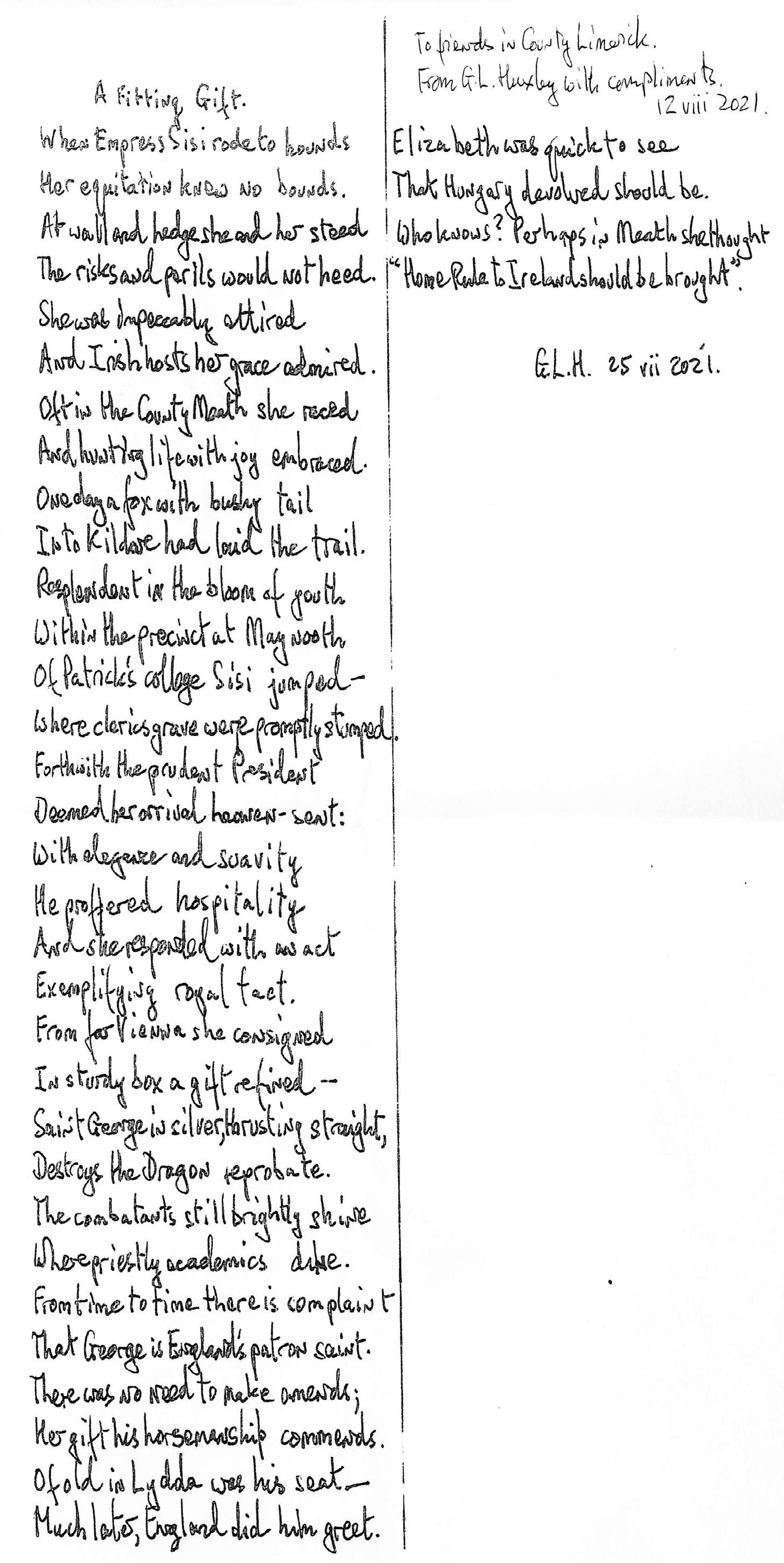

15 www.classicalassociation.ie
ASSOCIATION OF IRELAND
CLASSICAL
VALE
Professor George Leonard Huxley
(23 September 1932 – 30 November 2022)
George Leonard Huxley was born in England in 1932, the son of Leonard and Molly Huxley. He attended Magdalen College, Oxford, where he graduated in Literae Humaniores in 1955 and from then until 1961 he was a Fellow of All Souls College, Oxford. During this period, he was appointed Assistant Director of the British School in Athens for two years. Thus began a love affair with Greece where he excavated at both Knossos and Kythera. He met his wife, the archaeologist Davina Best, while excavating on Crete and they married in 1957. Davina predeceased George in 2020. He is survived by his sister, Margo, and the Huxleys' three children, Harriet, Sophia, and Corinna. In 1962 Professor Huxley was appointed to the Chair of Greek in Queen’s University, Belfast, which he held for over twenty years. And thus began his second love affair, with Ireland. In the early seventies he was a member of the executive of the Northern Ireland Civil Rights Movement, where, among other things, he lobbied for better housing for Catholics. He himself had become a convert to Catholicism at the age of twenty-one. Soon after his appointment at Queen’s he also co-founded the Hibernian Hellenists. This was a meeting of Classicists from north and south of the border, originally held at Ballymascalon, Dundalk, to facilitate ease for travel for both communities. These meetings would later move to Maynooth, becoming a major event in Irish scholarship. They ran for fifty years in an unbroken sequence and greatly helped put Irish scholarship on the map: for that alone, we are in Professor Huxley’s debt.
After leaving Queen’s in 1983 Professor Huxley returned, with his family, to a permanent address at Church Enstone in Oxfordshire but spent a great deal of his time travelling. He was twice visiting lecturer at Harvard University, also filling this role at the University of California in San Diego. But Ireland became his second home, and he worked tirelessly on promoting the Classics here. He was the main driver of an initiative, which has benefitted Irish universities greatly, that is the establishment of an Irish Institute of Hellenic Studies at Athens (IIHSA). Prior to this, our universities here had to shelter under the umbrella of the British School. It was he who established connections with the first funders and, also, secured support from the current President of Ireland, the then Minister for Arts and Culture, Michael D.
Higgins. It can truthfully be said that without his initiative the IIHSA would never have seen the light of day. Today students from the various Irish universities get to travel to Greece to do fieldwork and to research under the auspices of what is now a thriving Irish Institute of which we can be proud.
Professor Huxley was elected to membership of the Royal Irish Academy in 1971, acting as Secretary to the Polite Literature and Antiquities Committee from 19791986, and as Senior Vice-President in 1984-85 and again in 1999-2000. In 1984 he was chairman of the organising committee for the VIII International Congress of Classical Studies in Dublin. Other major commitments included his membership of the Irish National Committee for Greek and Latin Studies from 1972-86, 1991-99, acting as Chairman from 1976-1979. From 1986-1989 he was Director of the Gennadius Library at the American School of Classical Studies in Athens. In 1989 he became Honorary Professor of Greek at Trinity College Dublin, and he was also Honorary President of the Classical Association of Ireland in 1999. He held honorary degrees from QUB, TCD, and Maynooth. He would in time become an adjunct Professor in the departments of Classics and of Mathematics and Statistics at Maynooth University, to which he returned each year to deliver annual lectures until his late eighties. Always generous, he supported prizes at Maynooth in Classics and Mathematics, and in Patristics and Biblical Greek. He also donated substantial sums to the Russell Rare Book Library at Maynooth, which he often described as our best kept secret. His love affair with Ireland showed no signs of fading when in 2018 he became an Irish citizen, something of which I know he took great pride.
Professor Huxley was a world-renowned philologist and historian of the ancient world. In a publishing career spanning over fifty years, he wrote hundreds of articles and reviews. His books include Achaeans and Hittites (1960); Early Sparta (1962); Early Ionians (1966); Greek Epic Poetry (1969); On Aristotle and Greek Society (1979); and Homer and the Travellers (1988). This prodigious output was justifiably rewarded by a Festschrift in the Hermathena journal of Classics at TCD in 2006. He was buried in the graveyard of St Kenelm’s Church beside his wife Davina at Church Enstone, a stone’s throw from Forge Cottage where he had lived. One old friend made the trip from Kythera, Greece, where Professor Huxley had been made an Honorary Freeman many years before, to place soil from there into his grave. He would have liked that. Requiescat in pace.
Kieran McGroarty
16 DECEMBER 2022




 By LIAM BAIRÉAD
By LIAM BAIRÉAD


















 Thein
Thein





